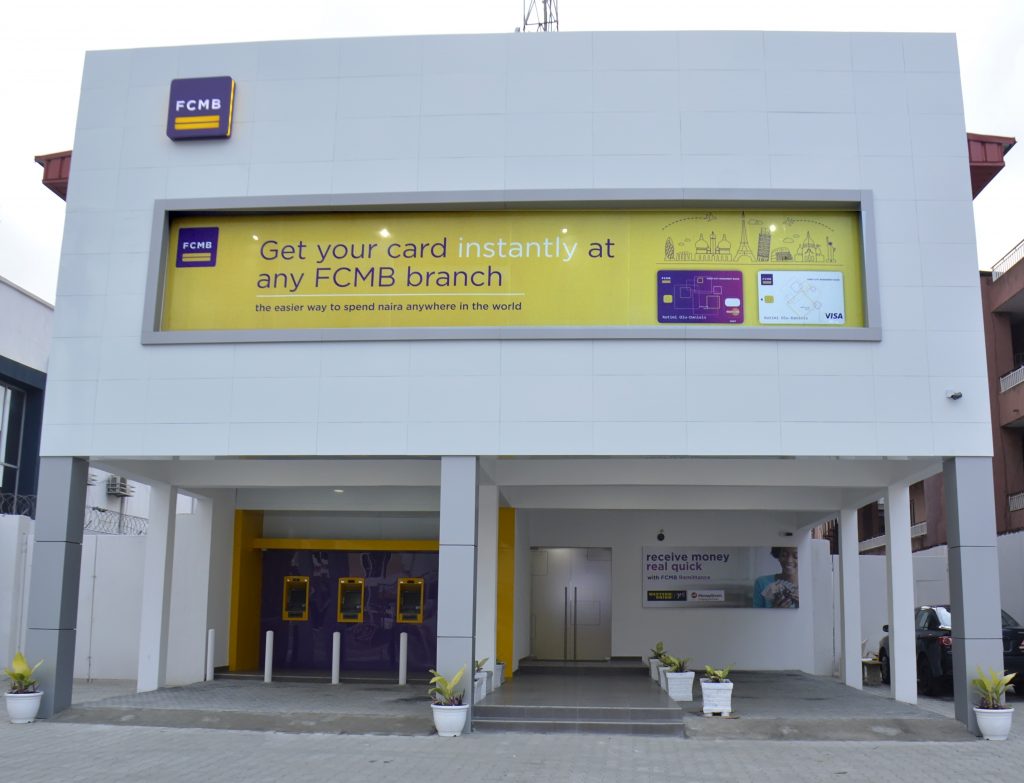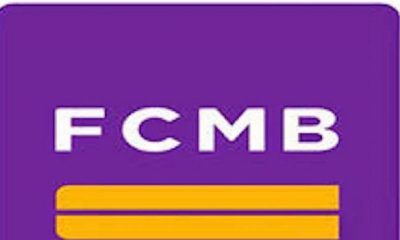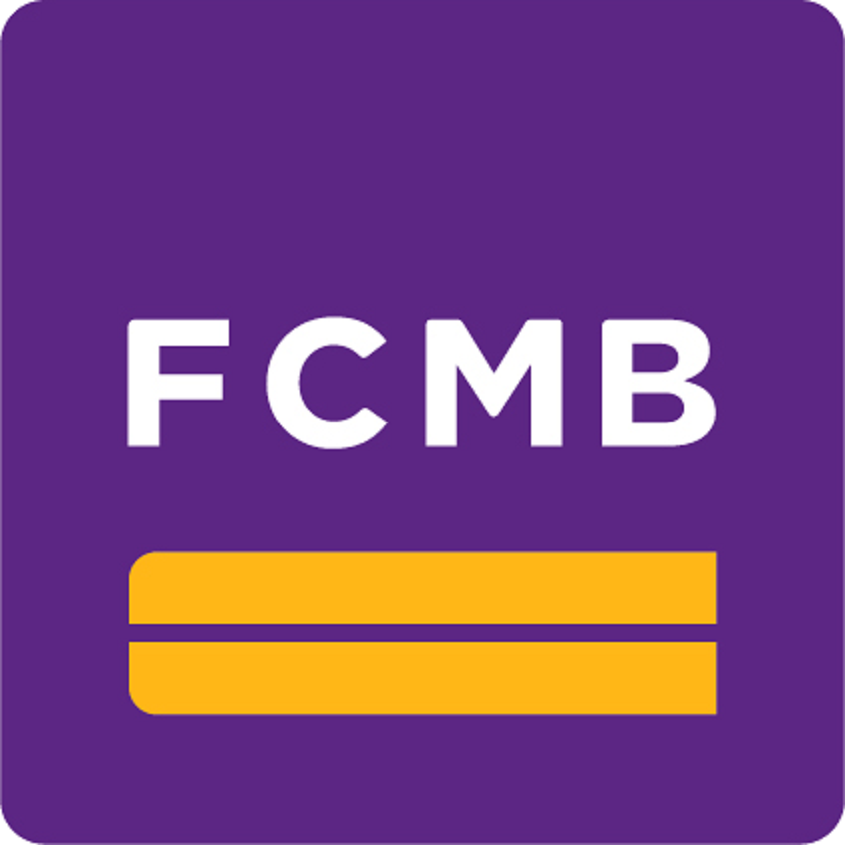Banking
FCMB to Sustain Conservative Dividend Policy to Boost Capital Position

By Modupe Gbadeyanka
Group chief executive of FCMB, Mr Ladi Balogun, has disclosed that the group will continue to maintain a conservative dividend policy so as to improve its capital position.
Mr Balogun made this disclosure during a conference call to stakeholders of the banking group on Friday.
According to him, the financial institution does not have plans to raise funds this year due to high funding costs, especially for borrowing in Dollars.
In its 2017 financial statements released this week, the board of FCMB proposed the payment of 10k per share dividend to shareholders.
As at Friday, April 6, 2018, the shares of FCMB were sold on the floor of the Nigerian Stock Exchange (NSE) for N2.35k per share.
Speaking on how the firm plans to make a possible impact this year, Mr Balogun said the tier-two lender expects its non-performing loans to rise in the course of the year but would be within a regulatory target of five percent.
In 2017, the financial institution recorded non-performing loans (NPL) to total loans ratio of 4.9 percent.
Also last year, FCMB booked a 50 percent impairment of N2.3 billion on loans to debt-laden 9mobile, which is in talks with investors to take over the telecoms firm.
This year, the bank expects loan growth to be flat, down from last year’s 5.4 percent rise, as oil companies pay down debt.
“We expect to see large repayments in the oil and gas sector this year. We agree that the (economy) will be improving but largely because of chunky paydowns, we don’t think we would be able to replace those quickly,” Mr Balogun stated.
The bank chief disclosed that FCMB would focus on retail banking with a higher margin this year to make up for a drop in government bond yields as the lender may not be able to write large loans quickly enough to counter-balance repayments by oil firms.
He said the economy was improving after Nigeria experienced its worst recession in a quarter of a century in 2016, which should boost consumers.
“We are pushing more in the area of retail banking,” he said.
According to him, the lender was seeking to convert its wholesale banking unit in Britain, FCMB UK, into a retail bank, as part of its push to grow its balance sheet and tap into non-institutional customers in Britain.
He said the impact of the British strategy would not be immediate but would enable the lender to achieve incremental growth.
Mr Balogun disclosed that the earnings contribution in Naira terms from the British unit will be around N500 million for 2018. FCMB UK grew pre-tax profit by 250 percent to N300 million last year.
“We’ve decided to slow down right now on asset growth and focus more on changing the mix of the asset and getting out some of the low margin upstream oil and gas business,” he said.
In its 2017 earnigns, FCMB achieved a gross revenue of N169.9 billion, a 4 percent decrease from N176.3 billion in 2016.
The decrease was primarily driven by the exceptional FX revaluation income in 2016.
The lender also posted a non-interest income of N32.0 billion for the full-year ended December 2017, a decrease of 33 percent Year-on-Year (YoY) from N47.7 billion for the same period prior year.
In addition, the net impairment on loans reduced by 33 percent YoY to N21.3 billion for the twelve-months ended December 2017, from N31.8 billion for the same period prior year, while the operating expenses increased by 5 percent to N68.7 billion for the full-year ended December
2017, due to contingent expenses.
During the year under review, the bank posted a profit before tax (PBT) of N11.5 billion, declined by 30 percent from N16.2 billion for the twelve-months 2016.
Banking
CIBN to Back ACAMB on Professional Development, Industry Advocacy

By Modupe Gbadeyanka
The Chartered Institute of Bankers of Nigeria (CIBN) has promised to support the ambitious plans of the Association of Corporate and Marketing Professionals in Banks (ACAMB).
At a meeting between the leaderships of the two organisations on Tuesday, the president of CIBN, Professor Pius Deji Olanrewaju, said it was impressed with the capability development and the undergraduate mentorship schemes of ACAMB under its leader, Mr Jide Sipe.
The CIBN chief commended the forward-thinking vision of the group, saying it had raised standards across Nigeria’s banking sector.
“ACAMB’s support has given CIBN and the banking sector brand equity,” he said, praising the association’s record in reputation management. recalling ACAMB’s role in addressing crises within the sector, describing the partnership as strategic and beneficial.
He further pledged support for ACAMB’s 30th anniversary in September 2026, its AGM, and other programmes, including fundraising initiatives.
“I want to assure you that everything you have presented today has been clearly noted and will be acted upon.
“We are fully committed to working closely with you so as to translate these discussions and vision into measurable progress. Our shared goal is to strengthen the sector, protect its reputation, and enhance its public image in a meaningful and lasting way.
“This meeting discussed various initiatives and reforms crucial for the future of our industry, including the need for continuous training and adaptation to new programs,” Mr Olanrewaju stated.
Speaking at the meeting, the president of ACAMB described the visit as a crucial first step in his tenure, aimed at contributing significantly to giving flight to his vision and that of ACAMB.
“When we assumed office, one of the first things we agreed on was the need to visit key stakeholders.
“However, before reaching out more broadly, we felt it was important to begin with our primary constituency and core stakeholders. We want them to understand the direction we are taking and to support the work we are doing, so that ACAMB can achieve greater success than it has in the past.
“We couldn’t have properly started our tenure without this very important meeting with the CIBN,” Mr Sipe stated
He introduced the newly constituted ACAMB Exco, which includes the 2nd Vice President, Morolake Phillip-Ladipo; General Secretary, Olugbenga Owootomo; Assistant General Secretary, Ademola Adeshola; Publicity Secretary, Abiodun Coker; and Executive Secretary, Fadekemi Ajakaiye.
Banking
All Set for Second HerFidelity Apprenticeship Programme

By Modupe Gbadeyanka
Registration for the second HerFidelity Apprenticeship Programme (HAP 2.0) organised by Fidelity Bank Plc has commenced.
The Divisional Head of Product Development at Fidelity Bank, Mr Osita Ede, informed newsmen that the initiative was designed to empower women with sustainable entrepreneurship skills.
The lender created the flagship women-empowerment initiative to equip women with practical, income‑generating skills and structured pathways to entrepreneurship.
“HerFidelity Apprenticeship Programme 2.0 reflects our commitment to continuous improvement. Having evaluated feedback from the first edition, we have returned with stronger partnerships and deeper mentorship programmes to ensure that women acquire not just skills, but sustainable economic opportunities,” he said.
“At the heart of the programme is guided, real‑world learning. Participants will undergo intensive apprenticeship training under reputable institutions and industry experts across select fields such as hair styling, shoe making, auto mechatronics, and interior decoration,” Mr Ede added.
He noted that HerFidelity Apprenticeship Programme 2.0 goes beyond skills acquisition by offering participants a wide range of business advisory services. These include business and financial literacy training, mentorship support throughout the apprenticeship journey, access to Fidelity Bank’s women‑focused and SME financial solutions, as well as guidance on business formalisation and growth strategies.
Further emphasising the bank’s vision, Mr Ede said, “By integrating structured mentorship with entrepreneurial development, Fidelity Bank is positioning women not just as trainees, but as future employers, innovators, and economic contributors within their communities. This aligns with our mandate to help individuals grow, businesses thrive, and economies prosper.”
Banking
The Alternative Bank Opens New Branch in Ondo

By Modupe Gbadeyanka
A new branch of The Alternative Bank (AltBank) has been opened in Ondo State as part of the expansion drive of the financial institution.
A statement from the company disclosed that the new branch would support export-oriented agribusinesses through Letters of Credit and commodity-backed trade finance, ensuring that local producers can scale beyond state borders.
For SMEs, the bank is introducing robust payment rails, asset financing for equipment and inventory, and supply chain-backed facilities that strengthen working capital without trapping businesses in interest-based debt cycles.
The Governor of Ondo State, Mr Lucky Aiyedatiwa, represented by his Chief of
Staff, Mr Olusegun Omojuwa, at the commissioning of the branch, underscored the importance of financial institutions in economic development.
“The pivotal role of financial institutions to economic growth and development of any economy cannot be overemphasised. It provides access to capital, supporting small and medium-scale enterprises and encouraging savings.
“Therefore, I have no doubt in my mind that the presence of The Alternative Bank in Ondo State will deepen financial services, create employment opportunities and stimulate economic activities across various sectors,” he said.
In her remarks, the Executive Director for Commercial and Institutional Banking (Lagos and South West) at The Alternative Bank, Mrs Korede Demola-Adeniyi, commended the state government’s leadership and outlined the lender’s long-term vision for Ondo State.
“As Ondo State steps into its next fifty years, and into the future anchored on the sustainable development championed during the recent anniversary celebrations, The Alternative Bank is here to be the financial engine for that vision. We didn’t come to Akure to hang banners. We came to fund work, farms, shops, and factories.”
With Ondo State’s economy anchored largely on agriculture, particularly cocoa production, poultry farming, and other cash crops, alongside a growing SME and trade ecosystem, AltBank is deploying sector-specific financing solutions tailored to these strengths.
For cocoa aggregators, processors and poultry operators, the bank will provide production financing, facility expansion support, machinery lease structures, and structured trade facilities under its joint venture and cost-plus financing models, with transaction cycles of up to 180 days for commodity trades and longer-term structured asset financing for equipment and infrastructure.
The organisation is a notable national non-interest bank with a physical network now surpassing 170 locations, deploying capital to solve real-world challenges through initiatives such as the Mata Zalla project, which saw to the training of hundreds of women as electric tricycle drivers and mechanics.
-

 Feature/OPED6 years ago
Feature/OPED6 years agoDavos was Different this year
-
Travel/Tourism10 years ago
Lagos Seals Western Lodge Hotel In Ikorodu
-

 Showbiz3 years ago
Showbiz3 years agoEstranged Lover Releases Videos of Empress Njamah Bathing
-

 Banking8 years ago
Banking8 years agoSort Codes of GTBank Branches in Nigeria
-

 Economy3 years ago
Economy3 years agoSubsidy Removal: CNG at N130 Per Litre Cheaper Than Petrol—IPMAN
-

 Banking3 years ago
Banking3 years agoSort Codes of UBA Branches in Nigeria
-

 Banking3 years ago
Banking3 years agoFirst Bank Announces Planned Downtime
-

 Sports3 years ago
Sports3 years agoHighest Paid Nigerian Footballer – How Much Do Nigerian Footballers Earn





















